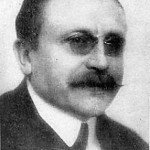 Name: Albert Mathiez
Name: Albert Mathiez
Lived: 1874-1932
Nationality: French
Profession(s): Academic, historian
Books: Le Bolchevisme et le Jacobinisme (1920), La Révolution Française (1924)
Perspective: Marxist
Born in eastern France, Mathiez’s family were peasant farmers. His upbringing and his family’s struggles would come to shape Mathiez’s political perspectives. The young Mathiez proved an exceptional student and showed a keen interest in history. He taught high school for a while before studying under Alphonse Aulard, probably France’s leading expert on the French Revolution in the early 20th century.
Mathiez was combative, short-tempered and unabashedly Marxist. His political position was hardened by the tragedy of World War I, which he condemned as an imperialistic and reactionary war, not unlike the Revolutionary Wars of the 1790s. He was a prolific writer but is best remembered for his three-volume history La Révolution Française (1922-1924).
Mathiez complimented the policies of the Terror, arguing that the cost of living for ordinary Parisians fell more during 1793-1794 than any other time. Robespierre and the Jacobins were ultimately overthrown by the bourgeoisie, Mathiez argued, once their property rights were threatened. His views on Robespierre proved controversial, even among other left-wing historians, but Mathiez defended them energetically. The author Romain Rolland later dubbed him the “archpriest of the cult of Robespierre”.
Mathiez died suddenly in 1932 but his interpretations of the revolution had some influence on one of his contemporaries, Georges Lefebvre.
Quotations
“The dictatorship of a party or a class is as a rule only established by force, and in time of war, this is necessarily so. Revolutionary government had as its inevitable accompaniment the Terror.”
“Revolutionary France would not have accepted the Terror if it had not been convinced that victory was impossible without the suspension of liberties.”
“Fear and immorality divided the members of the committees. Not everyone on the Committee of Public Safety shared Robespierre’s doctrines, and several looked on the ascendancy his virtue gave him over the people with jealousy.”
“Robespierre and his party perished mainly for having wished to make the Terror instrumental in a new upheaval of property”.
“Robespierre personified two equally essential things in a republic that wants to live: the cult of principles and devotion to the public good. Who would say that his example no longer needs to be recalled, that there are no lessons to be drawn from his life or politics?”
“Jacobinism and Bolshevism are dictatorships of the same kind. Both are born out of civil and foreign war; both are class dictatorships using the same means: terror, requisitioning and price controls. And both ultimately pursue the same goal: the transformation of society. And not just Russian and French society but of society in general.”
“The Russian revolutionaries are intentionally and knowingly imitating the French revolutionaries. They are animated by the same spirit. They move along the same problems in an analogous atmosphere.”
Information and resources on this page are © Alpha History 2015. Content on this page may not be copied, republished or redistributed without the express permission of Alpha History. For more information please refer to our Terms of Use.
